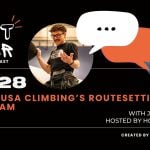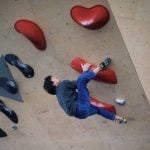This week’s homewall lives in Santa Ana, CA and uses music-reactive LED light strips to spice up backyard training sessions. Owner My V. replaced the upright supports with ratchets to turn his second-hand board into an adjustable and symmetrical masterpiece. Check out past HWOW here.

When did you build your wall? Was it a COVID baby?
End of June, so yes to Covid baby. I bought it second hand! Then I completely revamped the design, which was my plan from the start.
How long did it take you to build and what did that time look like?
It’s an on-going process of revisions, but I got it up and running the day I brought it home and was climbing on it that night.
What did the revamping look like? What was already built and what specifically did you have to re-do?
The revamp was extensive and at the same time not. The wall itself is unrecognizable now, but it took much less effort/time than building one from scratch (Image 1 and 2). It was kept indoors and had a fixed angle design. Here’s what was changed: 1. Replaced horizontal supports with a ratchet to vary the angle, as well as changing the vertical support design. 2. Doubled up the main vertical support legs. 3. Stained the support legs, primed and painted the climbing surface. 4. Tap covered the back since it’s now outdoors. The design itself was very good, but I knew I wanted an adjustable wall, and I made that happen day 1 of owning it.
Not including holds and padding, how much did it cost you to build? Any surprises there?
$400 including holds. I used about 30 plastic holds and about 30 homemade wooden holds! It was a steal! The surprise came in the amount of money I spent on holds.
What made you decide to go with a symmetrical, system-wall layout? Did you always have that format in mind?
I didn’t plan on having a symmetrical system-wall layout. My first lay out was a spray wall, but as I kept acquiring more and more holds, I realized I could give the symmetrical lay out a shot and I LOVE IT. It’s not perfect due to slight variance in holds, and a layout that’s not meant to be symmetrical, but I make it work. It has made setting and training twice as efficient. I only have to set half the climbs since if I set a climb that is symmetrical, I can then try it immediately on the other side. It also helped me identify some glaring weaknesses I have, such as pinch strength and lock off strength.
What are you doing for padding?
Crashpads from myself and friends. At the moment I have 7 crashpads. A tri-fold, three bi-folds, and an R3 that I borrowed from friends. And two R3 pads of my own. One of the pads is used simply as a bench to relax and watch though.

What was your primary incentive for the wall? Did anything in particular inspire your wall design?
Covid closed down the gyms and I don’t like the time investment required to go outdoors. I needed to climb, and hangboarding wasn’t enough. So, the wall was born.
@sendstory has a great design that I heavily based my design off of.
What was the most difficult aspect of the design and build?
My backyard had an atrocious layout and I’m a renter. The base of the wall sits on dirt, while the rest sits on cement that isn’t even leveled! Navigating around all of that took some effort since I can’t do much as a renter.
How did you end up leveling the ground for your wall? Did you run into any issues with your landlord?
The base sits on dirt that was originally 2-3 inches lower than the concrete, I fixed that by buying dirt and eventually mulch which was cheaper to level it out. I then threw on a wood board on top to create a flat stable surface for the base to sit on. For the uneven concrete it wasn’t a perfect solution, but I kind of just drilled holes slightly offset. Didn’t really measure anything, I could have made it more precise and accurate I’m sure, but it’s stable and feels sturdy.
What would you do differently?
Let the paint cure longer, but aside from that, it’s perfect. The only other issue was the varying price of holds.
Did you make any mistakes along the way or choose to re-do any aspects?
Definitely, but none of them are permanent so it’s okay. When I own my own place, I plan to build a much better wall, so it’s been good practice.

What mistakes did you make and what aspects did you choose to re-do?
No major mistakes come to mind as everything was salvageable. I’d add onto the paint or not to paint debate. I think painting would’ve worked wonderfully if I let it cure twice as long as I did. I used truck bed liner paint on my wall since it’s durable and has slight texture. After letting the paint cure for the advertised time, I put some holds on, which stuck to the wall, damaging the plywood and forcing me to remove them. However, I had no issues with holds sticking or paint coming off of areas that had more time to cure. I’ve also started chalking the back of my holds prior to placing them on, which may have also helped mitigate the hold sticking issue.
What is your favorite aspect?
The LED light strips around the perimeter that react to music input. It works great for illuminating holds during night climbs. It also gets me hyped before a send.
How often do you use the wall? Do you think you’ll still use it as much when all of the gyms open back up?
3-4 times a week. I plan to freeze my membership for about a year to recuperate costs that went into my woody, even when gyms open up.
Any words of wisdom to aspiring homewallers?
The wood isn’t the expensive part, it’s the holds that will drain your wallet.
Want us to consider your woodie for a future Homewall of the Week? Submit your homewall here to be considered. If yours is chosen you’ll win a prize like this (prizes vary each week):

















